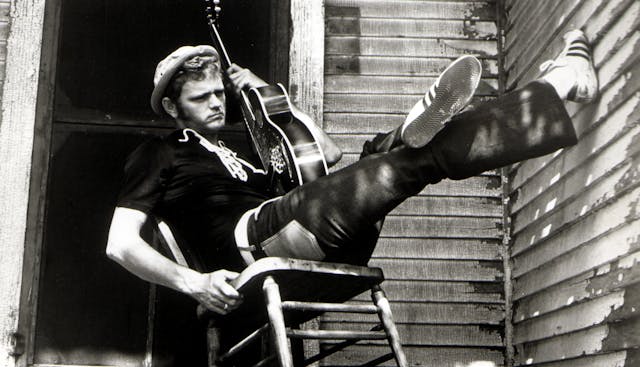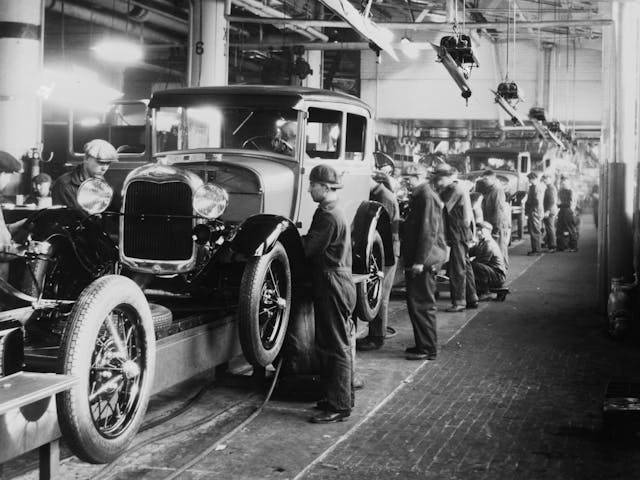The best anti-car song ever written
We dedicated the May/June 2023 issue of Hagerty Drivers Club magazine to the deep connections between music and cars, including several fun lists featuring your favorite car songs. Come back often or click the Music & Cars tag to stay up to date on these stories as they roll out online. You can also jam with our custom Music & Cars playlist on Spotify, available here.
If you’re one of the millions who own one of them gas-drinking, piston-clanking, air-polluting, smoke-belching, four-wheeled buggies from Detroit City, then pay attention; I’m about to sing your song, son.” So sang the Alabama Wild Man, Jerry Reed, a half-century ago in his 1973 country hit single, “Lord, Mr. Ford.” People have written a lot of love songs to the automobile over the years. They have names like “409” and “G.T.O.” and “Hey Little Cobra,” and they often get played on permanent rerun at car shows. “Lord, Mr. Ford” is not one of those songs.
It could be called a protest song, but it’s really about a love affair gone bad. It’s a reminder of all the ways that cars eat their owners and foul the skies. “Lord, Mr. Ford” pulls no punches; it calls cars a “ready-made pile of manufactured grief” and talks about being dollared to death and the “carbon dioxide haze a-hangin’ over the roar of the interstate.” As breakup songs go, it rivals Alanis Morissette’s much later “You Oughta Know” for driving home grievances with a nail gun, but does it all with a wink and a smirk. Nobody wanted to say it about cars, but by 1973, when the smog shrouding our traffic-clogged cities was at its gloopiest, somebody had to. And Jerry Reed, the sideburned guitar picker famous for calling everyone “son,” was the man to say it.

Reed was born to Atlanta cotton-mill workers and grew up listening to the Grand Ole Opry on the radio. His mother bought him a used guitar, which he attacked with a thumb pick, striking it viciously to produce a particularly sharp twang. He schooled on banjo great Earl Scruggs and called Chet Atkins a mentor, and he developed his own complex style of five-fingered picking that Nashvillians later dubbed “the Claw.” He appeared on television shows and in several films, most famously playing the dog-loving trucker Cledus “the Snowman” Snow opposite real-life buddy Burt Reynolds in Smokey and the Bandit. “I’m no actor,” he said, “I just play myself.”
But more often Reed appeared in honky-tonks, state fairs, and backwater casinos with warm-up acts like Tina the Performing Elephant. On stage, he was a friendly, down-home wisecracker whose songs often poked fun at common working-class dilemmas such as divorce (“She Got the Goldmine [I Got the Shaft]”) and getting arrested (“When You’re Hot, You’re Hot”).
Reed wasn’t supposed to be the man to sing “Lord, Mr. Ford.” Songwriter Dick Feller, who wrote much of the Smokey and the Bandit soundtrack, including “East Bound and Down” and “The Bandit,” said he actually wrote “Mr. Ford” for Jimmy Dean, the country music legend and sausage king. But “Dean was too busy selling sausages or something,” said Feller, and never recorded it.
Feller was what people back then called a “song stylist.” He wrote folksy romps such as “Biff, the Friendly Purple Bear,” and “Makin’ the Best of a Bad Situation,” which in three minutes manages to cover a man who loses an ear to an alligator, a wife who is having an affair with the milkman, and a woman whose husband thinks he’s a chicken. Born in Missouri, Feller moved to California because, he said, “Living in a little Missouri town, you think people [in California] don’t have acne or bowel movements or anything else that common people have.”
However, California didn’t work out. Nor did Nashville. So, Feller ended up in New York, where he said he didn’t write anything until nightfall, after he had donned a special pair of underwear and brewed a pot of tea. He wrote hits for Johnny Cash and recorded a whimsical lament of easy credit called “The Credit Card Song” that hit No. 10 on the country music charts. He cited a love of John Steinbeck paperbacks as well as hypnotism for his success.
Feller, who came out as a she in 2014 and became Deena Kaye Rose, once said he had a dream that he gave “Lord, Mr. Ford” to Jerry Reed, who had just recorded a tune about gas lines called “The Crude Oil Blues.” After waking up, Feller did just that, and the song immediately shot to the top of the country music charts. “I understand that the Ford people didn’t like ‘Lord, Mr. Ford’ too much,” Feller said, “but General Motors loved it.”
***
This article first appeared in Hagerty Drivers Club magazine. Click here to subscribe and join the club.
Check out the Hagerty Media homepage so you don’t miss a single story, or better yet, bookmark it. To get our best stories delivered right to your inbox, subscribe to our newsletters.



Jerry Reed was definitely one of the best and certainly one of my favorite people and musicians.
He’s an entertaining singer and the song is super catchy.
Funny bit. “When You’re Hot, You’re Hot” came out when I was in college in Charlotte; one of those songs that stuck in your head, suited the zeitgeist. Reed was good, a session player who backed up Joan Baez, herself an underrated guitarist. She and Michelle Phillips loved their new E-Types.
I enjoyed the Jerry Reed video very much, thank you.
NRBQ – “Get that gasoline blues”.
In memory of the early ’70’s OPEC policy.